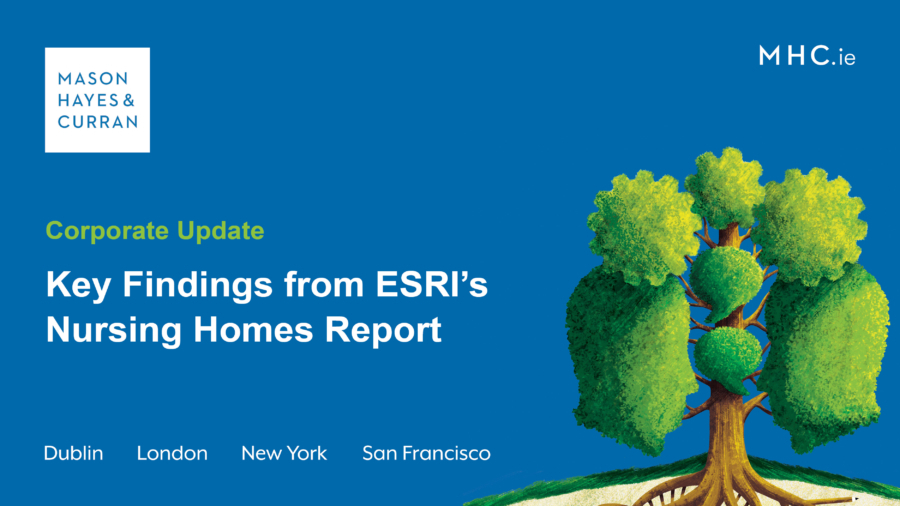Key Findings from ESRI’s Nursing Homes Report

The Economic and Social Research Institute (ESRI) has recently published a new report examining the challenges and changes facing the Irish long-term residential care sector since the onset of the COVID-19 pandemic. The report highlights that the supply and ownership of nursing homes has changed significantly over the past few years. It also sets out the significant differences in Fair Deal funding between public and private nursing homes. The report points out that State intervention was crucial to sustaining the nursing home sector during the pandemic.
Summary of key findings
A summary of the key findings in the ESRI report are as follows:
- As a consequence of the COVID-19 pandemic, the nursing home sector in Ireland faced high rates of COVID-19 infection and high mortality rates. It also faced financial strain as nursing homes were subject to increased operating costs due to, among other things, the cost of addressing staffing absences due to infection and enhanced cleaning responsibilities and infection controls. As a result, the State was required to intervene with significant resources, leading to the establishment of sector specific financial support through the Temporary Assistance Payment Scheme (TAPS). The report reveals that over €132 million was provided through TAPS by the end of 2021, with private providers using the scheme extensively.
- Many small nursing homes, in rural areas in particular, struggled to navigate the challenges presented by COVID-19 and, consequently, closed. These closures have caused a net loss of nursing home beds nationally despite the perceived increase in demand for bed spaces. While public nursing home closures were less common, bed reduction within those nursing homes also contributed to supply reductions as nearly half of all public nursing homes recorded a decrease in bed supply. Further to the ESRI’s regional analysis, while Dublin and commuter belt counties have seen increases in nursing home beds, rural counties, specifically Laois, Sligo, Donegal, Monaghan, Kerry and Leitrim, have the lowest per capita supply. The report describes how these regional inequalities are likely to increase further based on existing nursing home planning data.
- There has been a notable shift in the nursing home sector towards the private sector. It is reported that, by the end of 2022, over three-quarters of nursing homes are privately operated. Private equity funded Real Estate Investment Trusts (REIT) have been consolidating the market in recent years and it is reported that 14 large private operators now provide about 40% of all nursing home beds nationally. The ESRI also notes that independently owned and operated nursing homes, often family run businesses, which previously dominated the sector, now supply about 35% of beds nationally.
- The report discusses the varying staffing models used by different types of providers of nursing home care and raises questions in relation to incentives driving the private and public care providers. The ESRI describes that the increased dominance of private equity funded operators means that the nursing home sector is now intricately linked to economic conditions and international factors.
- Traditionally nursing homes, both public and private, in Ireland were owned and operated by the same entity or family. Under the new model of private equity ownership, nursing homes are owned by a real estate owning entity but care is provided by a separate operating entity. These structures result in the nursing home operators paying rent to REITs who can avail of tax advantages. This model also allows for ownership and residential care, regulations, hiring and the like to be treated separately.
- The ESRI notes a large difference in Nursing Home Support Scheme (Fair Deal) funding across public and voluntary/private nursing homes. It notes that average prices for a Fair Deal-funded bed in public nursing homes are 55% higher than in a voluntary/private nursing home. The report highlights that Fair Deal prices per bed have also not kept pace with increases in inflation and nursing homes in Dublin and commuter belt counties receive more Fair Deal funding per capita than in rural counties.
- The report refers to the expert panel on nursing homes, established to advise the Minister of Health, on the future of long-term residential care in Ireland. The expert panel previously highlighted a need for a shift towards more home-based care for older people outside of nursing homes. This recommendation, if implemented, is likely to significantly affect nursing home bed demand, the complexity of residents’ needs entering residential care and the need to better integrate nursing homes with other health and social care services.
- The report emphasises the need for policies to harmonise financial incentives for operators and care providers with the primary objective of fulfilling residents’ health and social care needs. It further provides that it is crucial for the sustainability of the sector that a balance is struck between:
- The financial viability of providers
- Compliance with regulations covering health and social care needs, and
- The strategic planning of supply to meet demand across the country
Conclusion
The ESRI’s report highlights once again the issues and challenges facing the nursing home sector in Ireland since the pandemic and reiterates the need for a sustainable long-term care system for older people in Ireland.
While there has been significant consolidation and investment in the Irish nursing home sector in recent years, this has slowed down as a result of increased operating costs and issues with funding. Without new investment in the sector, it is difficult to see how new bed capacity will be provided. It is understood that there are some projects under development or due to be completed soon. However, there are few projects planned given the current crisis in the sector.
HIQA independently regulates all nursing homes in Ireland. It sets the standards and quality of care across all nursing homes and conducts inspections on a regular basis. While there have been a number of reports on the sector, a key theme is that reform of the sector is urgently needed.
Ensuring full compliance with the many obligations and standards associated with owning and operating a nursing home requires careful consideration. For more information and expert advice on these issues or, indeed, regarding any anticipated transactions in the sector, contact a member of our Corporate or Healthcare teams.
The content of this article is provided for information purposes only and does not constitute legal or other advice.
Share this:



